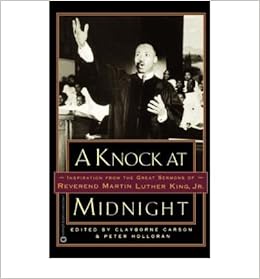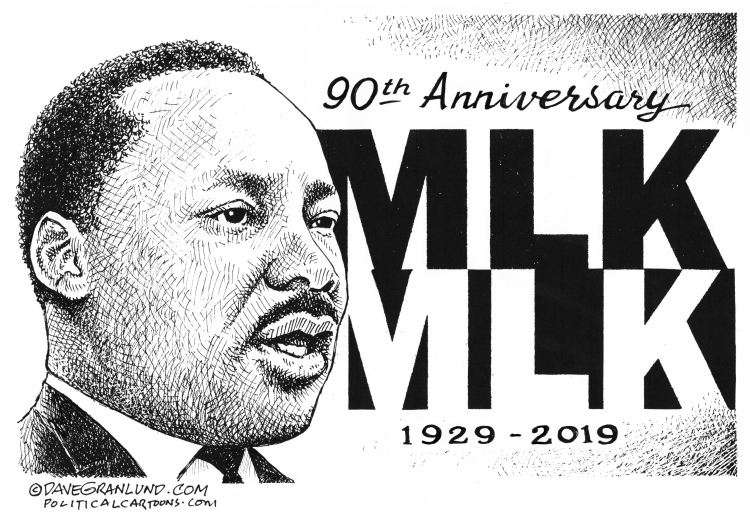O God, help me to journey beyond the familiar and into the unknown. Give me the faith to leave old ways and break fresh ground with You. Christ of the mysteries, I trust You to be stronger than each storm within me. I will trust in the darkness and know that my times, even now, are in Your hand. Tune my spirit to the music of heaven, and somehow, make my obedience count for You. Amen. (The Prayer of St. Brendan)
“Many continue to knock on the door of the church at midnight, even though the church has so bitterly disappointed them, because they know deep down within that the bread of life is there. The greatest challenge facing the church today is to keep the bread fresh and remain a friend to those at midnight. The church must proclaim God's son as the hope of the world.” (Martin Luther King, Jr. 1963)
To keep the bread fresh. I have sat with those words all week from Dr. King. They were in our prayers last Sunday and 55 years later I find those words as challenging as they were then. A challenge for the church, all of us, to keep the bread fresh for all who enter our doors.
He goes on to say:
“We must provide them with the fresh bread of hope and imbue them with the conviction that God is still working with this old sinful world, and he has the power to ring the good out of the evil.”
Fresh Bread of Hope that God is still working in our world. Ringing good out of evil. It is what we are all longing for. In part, I think it is why we are together in this place. Looking for the fresh bread of God.
I pray, it is something together we are doing right. That those who enter in, be at midnight, or daytime, that they find that hope & love, they find that fresh bread for their souls here.
“We have learned that there is great spiritual hunger among Episcopalians,” reports the Rev. Jay Sidebotham, director of RenewalWorks, (said in a press release). “And we are discovering catalysts that can address that hunger. Basic spiritual practices such as daily prayer, scripture study, worship attendance, and serving the poor will lead to transformation.”
A report was produced that emphasizes what churches can do to support Episcopalians’ growth in their spiritual journey and it something we talked about in Vestry. You can find an infographic of their report in our 2019 reports found underneath the blue cover (page 4). The four key catalysts are
engagement with scripture, the transforming power of the eucharist, a deeper prayer life and the heart of the congregation’s leader.
“If we want our congregations to be places where spiritual growth is happening, we need to teach and to nurture spiritual practices such as prayer, worship, study, and service,” the Rev. Scott Gunn, executive director of Forward Movement.
I wholeheartedly say Amen. That’s why we handed out Psalms for you last summer. Why the doors of this holy place are open 24/7/365.
Studying the bible, coming to worship and participating in our sacraments, praying and serving the needs of others are at heart of our discipleship.
Your leadership, both me and the Vestry are endeavoring to have the heart of a leader, a commitment to our own discipleship, including dedication to spiritual practices, and service in the world. I believe we are faithfully following Jesus.
I think of the Gospel for today. After Jesus had been baptized by John, after his journey through the desert tempted by Satan, he begins his ministry at synagogues in the land he knew well. His teaching is well received.
And then in his hometown, He unrolled the scroll of the prophet Isaiah and found the place where it was written:
"The Spirit of the Lord is upon me, because he has anointed me to bring good news to the poor. He has sent me to proclaim release to the captives and recovery of sight to the blind, to let the oppressed go free, to proclaim the year of the Lord's favor."
He rolled up the scroll, gave it back to the attendant, and sat down. The eyes of all in the synagogue were fixed on him. Then he began to say to them, "Today this scripture has been fulfilled in your hearing."
Jesus brings the good news and he brings love: so the poor, the captives, the blind, the oppressed and everyone might know the Lord’s favor. No one will be left out of the message.
Not the marginalized. Not the forgotten. Not the out group. No one. All we see the glory of God.
In her book Redeeming Ruth: Everything Life Takes, Love Restores, Meadow Rue Merrill writes about her daughter Ruth and the powerful impact her brief life had on her family and community.
Meadow and her husband, Dana, adopted Ruth when the little girl was two. Ruth had cerebral palsy and was brought from her orphanage in Uganda to Maine for physical therapy. The Merrills met Ruth through friends. Everyone in the family fell in love with the little girl. Urged on by their three children, Meadow and Dana arranged the adoption. Their time together was challenging: Ruth was also deaf, couldn’t sit up, talk, walk or use her hands to sign — but every moment with Ruth was a blessing. While Ruth was excelling in school, her health was more fragile than they imagined. Sixth months into her first year of school, Ruth unexpectedly died in her sleep.
“Psychologists often say that there is no greater loss than the loss of a child,” Meadow Rue Merrill writes, “but even in that overwhelming darkness, there were sparks of light, such as the boy with autism from Ruth’s bus who rang our doorbell clutching a bouquet of pink roses. ‘I miss her smile,’ he said, struggling to form each word. ‘Me, too, I said, accepting the gift.
“Only slowly did our family come to understand the many lives Ruth had touched.”
Ruth’s first-grade teacher told Ruth’s mom about Sean, a boy in the class. On day in the fall, Sean came home from school and announced that he had a girlfriend.
“Oh?” Sean’s mother asked. “What do you do together?” “We don’t do anything,” Sean said.
“What do you talk about?” she asked. “We don’t talk,” Sean said.
Sean’s mom thought he had imaginary friend. “Then what do you do?” she finally asked.
“When I jump up and down on the playground, she smiles at me and laughs!”
“I don’t think Sean ever saw Ruth’s disabilities,” the teacher said. “He saw her smile, and it made him feel so good that he loved her.”
Ruth’s mom reflects: “I touched my heart in wonder and marveled at the power of a smile to overcome even the most enormous differences. Not long after, when I returned to helping in Ruth’s class, Sean was gone. His family had moved. I didn’t even know his last name, but I prayed that he would always remember the girl whose smile had been enough.”
A little girl’s smile is the very light of God to her Maine family, school and community. Though confined to a wheelchair and totally dependent on others, Ruth brought out the best in everyone around her and, in doing so, revealed the Spirit of God’s love in their midst.
That Spirit is upon us, as well; guiding us to the prophetic work of realizing God’s kingdom in our own time and place, be it Nazareth or Maine or Monroe, CT. We make Isaiah’s vision a reality in every act of hope we manage, in every simple and unremarkable kindness prompted by God’s grace. As witnesses of Christ’s resurrection, as baptized disciples of his church, we inherit the Spirit’s call to bear glad tidings and proclaim the Lord’s favor to the poor, the imprisoned, the blind, the oppressed and the helpless.
Whatever gifts and graces we possess can work great and wondrous things when done in the Spirit of God in our world.
And we do that by committing our lives, what we say and what we do as followers of Jesus.
Early in his ministry, Jesus of Nazareth was surrounded by crowds. He turned and asked, “What do you seek?” (John 1:38). For more than a thousand years, monastics have greeted pilgrims knocking on their doors by asking: “What do you seek?” Today, each of us asks that same question in our lives. Our hopes and yearnings that draw us to faith may not be so different from one another. For we seek love, freedom, abundant life. We seek Jesus.
We have been talking about the Way of Love: practices for a Jesus centered life that our presiding bishop introduced last summer. Such practices can help us together grow more deeply with Jesus Christ at the center of our lives, so we can bear witness to his way of love in and for the world.
The deep roots of our Christian tradition offers such a path. For centuries, monastic communities have shaped their lives around rhythms and disciplines for following Jesus together.
If we are going to live as disciples of Jesus, following his way of love, filled with the Spirit, then we need to be intentional in our journey. In our practices. In our lives.
By entering into reflection, discernment and commitment around the practices of Turn - Learn - Pray - Worship - Bless - Go - Rest, our spirituality will grow as a parish and as individuals, following the loving, liberating, life-giving way of Jesus. His way has the power to change each of our lives and to change this world.
Dorothy Day: " ‘What good can one person do? What is the sense of our small effort?’ They cannot see that we must lay one brick at a time, take one step at a time; we can be responsible only for the action of the present moment but we can beg for an increase of love in our hearts that will vitalize and transform all our individual actions, and know that God will take them and multiply them, as Jesus multiplied the loaves and fishes. The greatest challenge of the day is: how to bring about a revolution of the heart, a revolution which has to start with each one of us."
A revolution of the heart. Keeping the bread fresh. Bearing the good news and proclaiming the Lord’s favor to all.
My friends, we have our work cut out for us as members of this beautiful parish.
It all begins with each one of us. A flowing of love to the world through words and deeds.
Join me in the way of love: in life giving practices that will help transform our lives and our world.
Amen.






